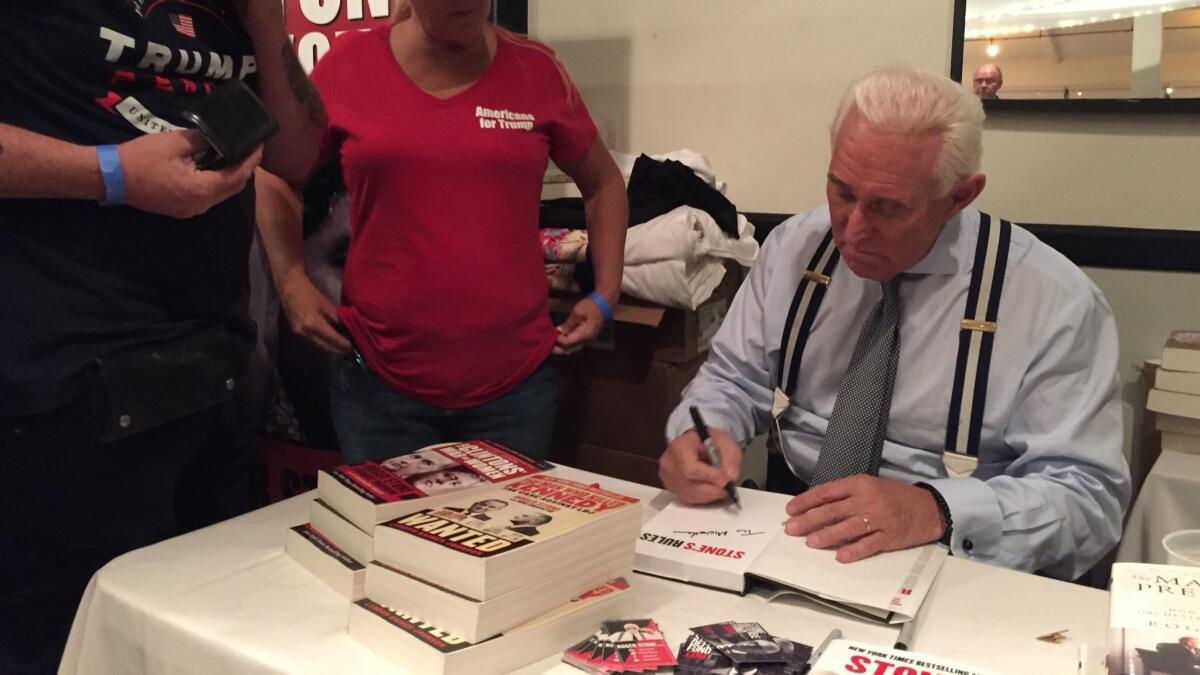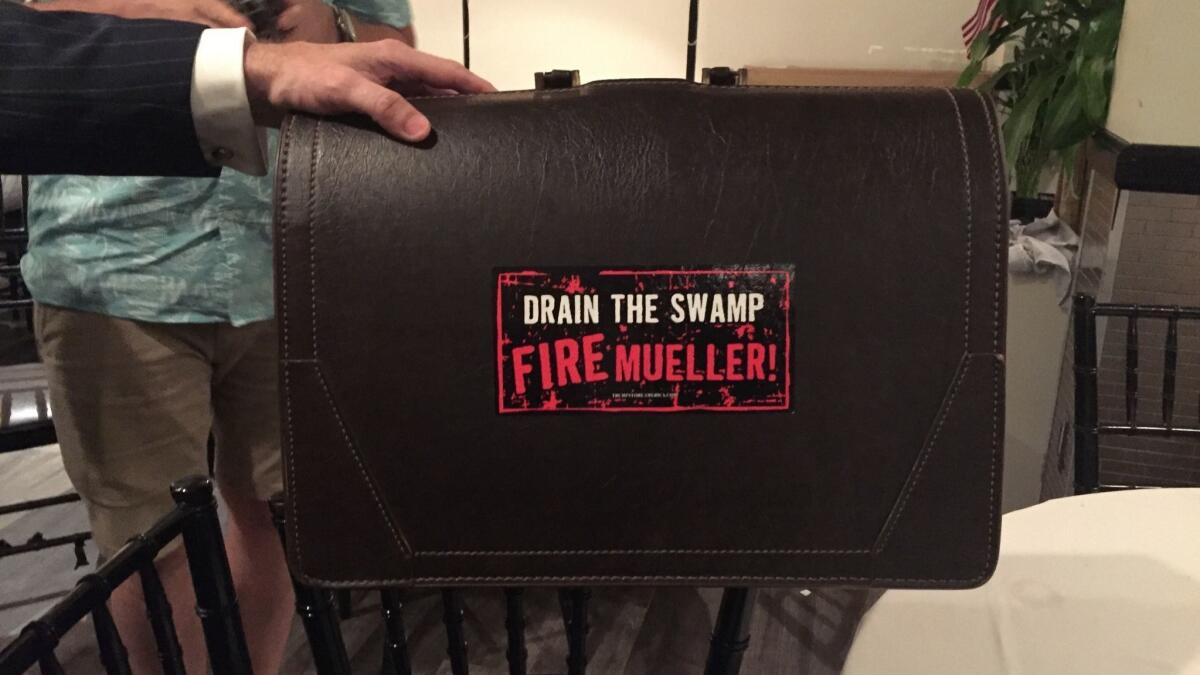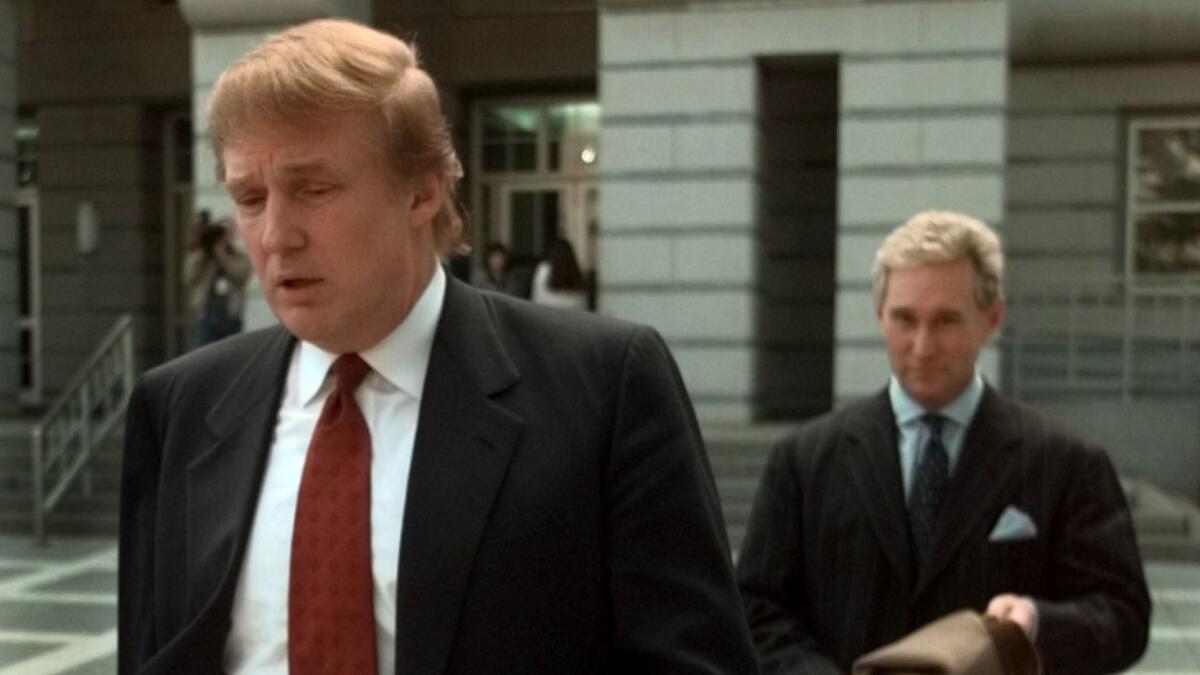Roger Stone has embraced infamy and controversy. The Russia investigation has him in a state of denial

- Share via
Reporting from Pompano Beach, Fla. — The sun had set outside the banquet room when Roger Stone took the stage, a pale blue handkerchief sprouting from the chest pocket of his double-breasted gray suit.
Hundreds of miles away in Washington, prosecutors are assembling a case that could lead to Stone’s indictment in connection with Russia’s efforts to interfere with the 2016 election. But here at a dinner hosted by Americans for Trump, a fan club for the president’s hardcore supporters, the investigation is a punch line.
Stone pauses his speech to sip his drink through a cocktail straw. “That was vodka, but not Russian vodka, to be clear,” he assures the laughing audience.
A few hundred people jam tables and line the walls to hear from Stone, the 66-year-old veteran political strategist whose ties to Trump date back four decades, longer than any of the president’s other advisors. For this crowd, Stone is an authentic emissary for the president they idolize, regardless of any investigation.
He closes his speech with two pleas: Vote for Republicans and donate to his legal defense fund.
Stone has spent his life tap dancing between fame and infamy, courting controversy and embracing his reputation as a dirty trickster while insisting he’s never broken the law.
Now the Russia investigation has forced him into an unusual position: Instead of claiming credit for an audacious political stunt, he’s denying any involvement.
The question that special counsel Robert S. Mueller III and his investigators want to answer is whether Stone is linked to Wikileaks and the release two years ago of Democratic Party emails hacked by Russians. He’s denied wrongdoing and, despite a collection of circumstantial clues, no clear evidence has become public to prove him wrong.
“I’ve always made it clear that I practice hardball politics, but I draw the line at breaking the law,” Stone said in an interview here after his speech Tuesday night.
Follow the latest news of the Trump administration on Essential Washington »
Even within Trump’s colorful collection of friends and advisors, Stone stands out.
A sense of his place in the political world can be gleaned simply from the list of his associates Mueller’s team has brought before the grand jury. There’s Jerome Corsi, a leading proponent of the false theory that President Obama wasn’t born in the United States. And there’s Kristin Davis, better known as the “Manhattan Madam” for her role running a high-dollar New York prostitution ring.
Also subpoenaed were Randy Credico, a liberal New York radio host who performed impressions of political figures during a news conference after his grand jury appearance, and Sam Nunberg, a onetime Trump campaign official who testified only after a series of manic media appearances in which he threatened to refuse to cooperate with prosecutors.
In the midst of it all stands Stone, a man whose peers have variously described as a braggadocious showboat or one of his generation’s sharpest political minds. What critics and friends agree on is that he’s ruthless and calculating.
“Politically, he would push the envelope,” said Charles Black, a Republican strategist and lobbyist who has worked alongside Stone in the past. “If you had a need to run an attack ad on somebody, he would be the first to speak up and say, ‘Let’s do it.’”
An indictment would be an ironic bookend to a political career that began in scandal during the Watergate era. Back then, Stone was a young volunteer for President Nixon’s reelection committee. Among other deceptions, Stone donated money to a Democratic campaign in the name of the “Young Socialist Alliance” — then sent the receipt to the local newspaper.
Now the allegations are more dire.
As part of the investigation, Mueller has collected Stone’s private communications, interviewed his associates and empaneled a grand jury to review evidence. Stone said prosecutors haven’t contacted him, a possible sign that he’s a target.
“If the grand jury and their investigation operates on the basis of the facts and evidence, then everything will be fine,” he said in the interview.
A lot of those facts don’t look particularly good for Stone; he insists there’s an innocent explanation for everything.
In August 2016, Stone told a Florida Republican group that he had “communicated with [Julian] Assange,” the leader of WikiLeaks. At that point, the organization had already published emails hacked from the Democratic National Committee.
Now he says that, in truth, he merely knew someone — Credico — who was in touch with Assange. Credico has denied that he served as a back channel between Assange and Stone.
Later that month, Stone tweeted, “Trust me, it will soon the Podesta’s time in the barrel.” Shortly afterward, WikiLeaks began releasing thousands of emails hacked from the account of John Podesta, Clinton’s campaign chairman.
Stone claims the grammatically challenged tweet actually referred to “the Podestas,” meaning John and his brother Tony, a prominent lobbyist under scrutiny for work on behalf of Ukraine’s former government.
Stone also made a cameo, albeit unnamed, in a July indictment from Mueller’s office. Russian military intelligence officers, using the online persona Guccifer 2.0 to disguise their involvement, allegedly wrote to “a person who was in regular contact with senior members” of Trump’s campaign and pointed him toward a hacked Democratic Party document that had been posted online, the indictment charges.
Stone, who had already posted on his blog what he described as the entire exchange with Guccifer 2.0, said the messages were innocuous and don’t include any references to emails or upcoming releases.
Stone insisted there’s no proof of a conspiracy because there wasn’t one. He never had inside information on the hacking or when emails would be published, he said, nor was it a topic of conversation between him and Trump or campaign officials.
But if there’s suspicion, it’s due in part to Stone himself, who has dropped plenty of bread crumbs about a connection to WikiLeaks. He once told Nunberg that he had dinner in London with his “new pal” Assange. Stone later said he was joking, and Nunberg agrees.
“I don’t believe that Roger had actual communications with him,” Nunberg said. “He was doing what Roger does best, which is insinuating himself into history.”
Stone said the investigation has become an unpleasant cloud over him and his family, but he’s also embraced the moment out of necessity.
For starters, he said, the attention is good for his legal bills, which he expects to reach $2 million. The more coverage he receives, the more donations he gets.
He also believes there’s no use taking the 5th Amendment in the court of public opinion.
“When you don’t comment, people assume you’re hiding something,” Stone said.

The Americans for Trump event at Gallupi’s, a restaurant and event space next to Pompano Beach’s golf course, gave Stone an opportunity to tell his side of the story, especially in the wake of what he describes as unfair news coverage.
Stone arrived with an entourage from the Proud Boys, a right-wing group that describes itself as “Western chauvinists” but which critics call a violent, racist gang.
According to Stone, the group is neither bigoted nor violent. He said he’s faced death threats, and the Proud Boys serve as his security, clearing a path and standing sentry as he grants interviews.
The Proud Boys were eager to do their part. When a man trying to reach the restaurant’s outdoor bar brushed past Stone, who was speaking to the conservative outlet Newsmax, one of the guards tried to stop him, nearly leading to a shoving match.
But other than that brief altercation, Stone was on friendly turf with a collection of Trump superfans who had spent at least $35 for tickets to the three-course dinner.
A toast to Brett M. Kavanaugh’s Supreme Court confirmation, which occurred after he denied allegations of committing a drunken sexual assault while in high school, was led by a man wearing judge’s robes and holding a gavel in one hand and a beer in the other. When a singer prepared to deliver the national anthem, she reminded the crowd that there would be “no taking a knee.” The group’s president, a personal injury and medical malpractice attorney named Scott Newmark, carries a briefcase with a bumper sticker that says, “Drain the swamp fire Mueller!”
He was thrilled to have Stone speak at the dinner.
“He’s beloved. He’s loyal. He’s passionate. He’s a defender,” Newmark said.
Stone has associated himself with a broad range of provocateurs and conspiracy theorists. Five days a week, he hosts a radio show on InfoWars, which is run by Alex Jones, who hawks testosterone supplements and has suggested that school shootings were faked. Stone doesn’t indulge in that particular conspiracy theory himself, and he notes that he also appears on CNN, even though he doesn’t agree with everything said there, either.
In the meantime, Stone also dishes out advice to longshot Republican candidates like Omar Navarro, who is running to replace Rep. Maxine Waters (D-Los Angeles).
“He’s a mover and shaker in this world,” Navarro said of Stone. “He’s a very inspirational guy. He’s got a lot of people who admire his work.”
For a time in the 1980s, that work included his involvement, along with Black and Paul Manafort, in a firm that broke new ground — or crossed an ethical line — by combining political consulting and government lobbying under one roof.
Stone eventually decided that the life of a lobbyist wasn’t for him.
“We were trying to build a white-shoe establishment lobbying firm. And Roger didn’t like it,” Black said. “He’d just tell me it was boring.”

Trump was more Stone’s speed. They were first connected by Roy Cohn, the notorious lawyer and fixer in New York, when Stone was raising money for Ronald Reagan’s presidential campaign.
Stone later served as Trump’s lobbyist and political whisperer, periodically encouraging him to run for office.
“I wanted him to run for president since 1988,” Stone said.
Trump was the perfect fit for Stone’s fortune cookie political wisdom, which includes proclamations like “Attack, attack, attack — never defend” and “Politics is not about uniting people, it’s about dividing people.”
But by the time Trump actually launched his White House bid in 2015, Stone didn’t last long on the campaign.
Corey Lewandowski, who served as the first of Trump’s three campaign managers, calls Stone “a serial liar” who “no longer had any value” and was booted from the operation.
“He said, ‘Well, I’m going to quit,’” Lewandowski recalled. “And I said, ‘Well, you’re already fired.’ And he said, ‘You can’t fire me because I’m about to quit.’”
After the story broke, Stone insisted he quit first. “I fired Trump,” he tweeted.
Stone and Trump remained in touch, however, a reminder that their relationship has endured ups and downs before.
In 2008, Trump told the New Yorker that “Roger is a stone-cold loser.” Then, in the 2017 documentary “Get Me Roger Stone,” Trump said Stone “understands politics” and “he’s very good at it.”
For now, the relationship seems to be on hold because of the Russia investigation. Stone believes the last time he talked to the president was after Republicans pushed their tax cut legislation through Congress last year.
“I think his attorneys have suggested that it’s best that we not speak until this matter is culminated,” Stone said.
Twitter: @chrismegerian
More to Read
Get the L.A. Times Politics newsletter
Deeply reported insights into legislation, politics and policy from Sacramento, Washington and beyond. In your inbox twice per week.
You may occasionally receive promotional content from the Los Angeles Times.











